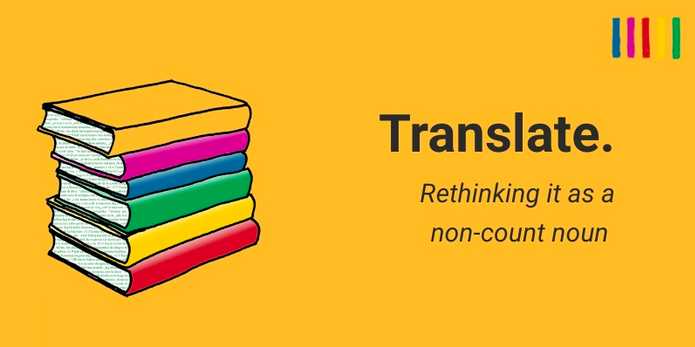
Should we use “translate” as a noun? A case of “nominalisation” of a verb
by Pisana Ferrari – cApStAn Ambassador to the Global Village
The conversion of verbs into nouns is called “nominalisation” (the opposite, turning nouns into verbs, is called “verbing” or “denominalisation”). There are two types of nominalisation. The first involves adding a suffix: the verb “to investigate” produces the noun “investigation.” The second type is known as “zero derivation”, or “conversion”, i.e. a word is switched from verb into noun without the addition of a suffix, e.g “translate”.
A phrase such as “How much translate do you need?” or “What’s our translate set-up?”could help more easily identify emerging states of affairs when computer systems working on richly-qualified data can best characterize many, if not all, translation events. We are quoting Andrew Joscelyne – European language technology journalist, consultant, analyst and adviser – from a recent article he has written for the TAUS blog. Joscelyne adds that this usage of “translate” would (obviously) be calqued on the current trend of using “compute” as a noun, meaning something like “computational capacity” (as in “How much compute do you need for that machine learning task?”). For Joscelyne “translate” as a noun would be able to capture the entire range of translation activities, from innovating at the algorithm level, and calibrating performance at the chip level, to optimizing every aspect of the data level.
We looked up “nominalisation” to see what we could find and came across two, not so recent, but interesting, articles for The NY Times “Opinionator” blog. The first one is by Henry Hitchings, who is the author of three books exploring language and history, the other by linguist Helen Sword. Hitchings says that, on the whole, nominalisation, in particular the second type (which he calls Type B), is annoying and really “grates”. He says people mostly dislike reading or hearing clusters of such nouns, and associate them with legalese, bureaucracy, corporate jive, advertising or the more hollow kinds of academic prose. Writing packed with nominalisations is commonly regarded as slovenly, obfuscatory, pretentious or merely ugly. But, he says, Type B nominalisation can used to obtain different effects in writing.
– In the case of “Do you have a solve for this problem?”, for example, using “solve” rather than “solution” can give an impression of freshness, by avoiding an everyday word; to some it might sound jauntier and more pragmatic than “I have a solution”, and it is more concise and less obviously Latinate (though the root of “solve” is the Latin solvere, Hitchings notes).
– If one speaks of “the magician’s reveal” rather than of “the magician’s moment of revelation,” this evokes the thrill of a sudden unveiling or disclosure, he says.
– Using a Type B nominalisation may also seem humorous and vivid. Thus, compare “that was an epic fail” (Type B nominalization), “that was an epic failure” (Type A nominalization) and “they failed to an epic degree” (neither).
-Nominalisations can also have a “distancing” effect. “What is the ask?” is less personal than “What are they asking?”
Helen Sword calls words formed via nominalisation, even the Type A ones, “zombie nouns”, because “they cannibalize active verbs, suck the lifeblood from adjectives and substitute abstract entities for human beings”. A paragraph heavily populated by nominalisations will send your readers straight to sleep, she adds. “Wake them up with vigorous, verb-driven sentences that are concrete, clearly structured and blissfully zombie-free”.
Hitchings is not quite so drastic, he says that it is simplistic to have a blanket policy of condemning nominalisations. Sometimes we need to do things that are “aesthetically unpleasant” in order to achieve other effects, be they polemical or diplomatic. After all, the phenomenon is far from new: “ask” has been used as a noun for a thousand years, he says, “reveal” has been used as a noun since the 16th century and “solve” since the 18th century.
Sources
“Translate, n. “digital capacity to use language translation to solve problems”, Andrew Joscelyne, TAUS newsletter, October 11, 2019: https://bit.ly/2pKJNG2
“Those Irritating Verbs-as-Nouns”, Henry Hitchings, The Opinionator, NT Times blog, March 30, 2013: https://nyti.ms/2NW9drZ
” Zombie Nouns”, The Opinionator, NT Times blog, July 23, 2012: https://nyti.ms/33z9KXC
Photo:
Screenshot of photo accompanying the above mentioned article on TAUS blog